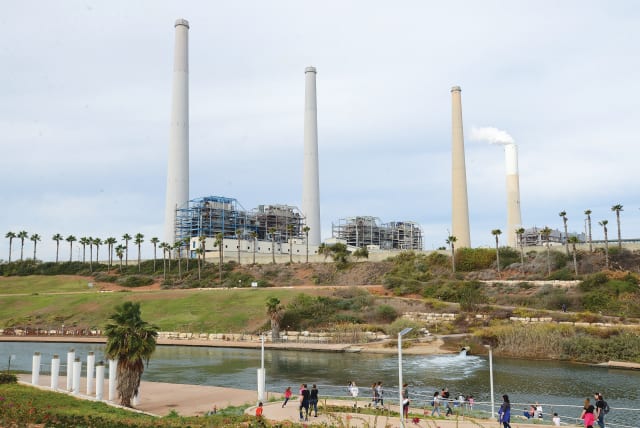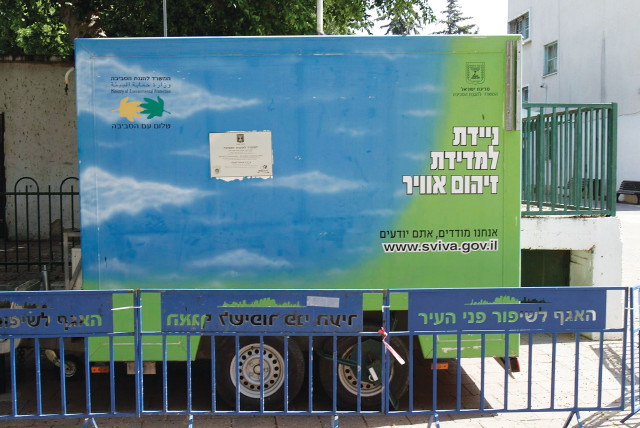'License to pollute is license to kill'

Controversial Knesset bill could put public health, environment at risk.
Air pollution in Israel is so bad it is making people sick. Now the Knesset may make that situation worse.
On Wednesday night, the Internal Affairs and Environment Committee pushed forward legislation that, if approved by the plenum, could degrade Israel’s air quality.
Experts are concerned that, in promoting the legislation, politicians are more concerned about boosting business than protecting public health.
“Pollution causes a lot of sickness. So how much does sickness cost the marketplace?” Dr. Arye Wenger, head of the air and energy department at Adam Teva V’Din, asked.
He accused the Energy and Finance ministries of eyeing short-term gains and money over the public’s and the environment’s long-term health, explaining that a proper cost analysis has yet to be completed.
“No one has done an accurate calculation,” he said.
What is the legislation that could endanger the health of Israelis?
Wenger’s frustration is over government proposals contained in this year’s economic arrangements bill which accompanies the state budget, proposals that weaken the Clean Air Law and other environmental checks.
Environmental activists and public health professionals have warned that the legislation, which passed by a vote of six to five in the committee overnight Wednesday and now faces a second and third reading in the plenum before the end of the month, will cause “impossible to reverse” harm to human and environmental health, said Prof. Hagai Levine, chairman of the Israeli Association of Public Health Physicians.
“The balance [between economy and health] has been violated, and the expected result is an increase in air pollution in Israel, increasing mortality, cardiac and respiratory disease and congenital anomalies, Levine charged, calling on the Knesset “to act responsibly” and oppose the legislation.
Although the original legislation was even worse than what was passed on Wednesday, according to Tomer Gertel, head of government relations for Green Course, “it went from really, really bad to really bad,” he said.
WHEN IT comes specifically to air pollution, the lengthy legislation includes permission for the Independent System Operator which manages the electricity grid (NOGA) to avoid the requirements of the Clean Air Law in the event of threats to the constant supply of electricity, whether due to production or transmission challenges or damage.
It also limits the Environmental Protection Ministry’s role in monitoring and approving the environmental impact of big infrastructure projects, to fast-track them. The Finance Ministry said it aims to “remove bureaucratic and regulatory barriers” so that these projects, mainly in transportation and electricity, can be completed faster.
While initially it was proposed that Environmental Protection Ministry representatives would be replaced by private economic advisers, the passed version allows the ministry’s advisers to operate under strict and likely unmanageable timetables, explained Gertel. And if these timetables, set by the Finance and Internal ministries, are not met, then the Environmental Protection Ministry representatives can still be replaced by private environmental advisers.
“It is a license to pollute, which is a license to kill,” Levine told The Jerusalem Post, noting that nearly half of the country’s air pollution comes from electricity generation.
“The Clean Air Law enacted in 2008 is a groundbreaking law at the global level, and its purpose is to improve air quality and prevent and reduce air pollution, among other things, by establishing prohibitions and obligations,” said MK Yorai Lahav Hertzanu, a member of the Internal Affairs and Environment Committee who voted against the bill.
He said the Clean Air Law is meant to protect human life, health and quality of life and safeguard the environment, including Israel’s natural resources, ecosystems and biodiversity, for the public and future generations.
“While we introduced changes to the legislation that reduce its damage,” he said, “I am totally opposed to any law that punctures the Clean Air Law. I am afraid not only of the practice but mainly of the precedent. What will prevent other polluters tomorrow morning from using this precedent and saying we also want to exceed the emission or the pollution permits? This balance will be violated repeatedly, severely harming the environment and public health.”
Moreover, Wenger stressed that fast-tracking energy infrastructure projects would not solve Israel’s energy crisis. He said that trumping the Clean Air Law to build further polluting projects is, at most, a Band-Aid fix, in that Israel needs to develop and implement a long-term plan to meet the country’s electricity needs.
Israel currently has a population of around 10 million people. Projections are that the population will rise to approximately 15 million by 2048, requiring increased electricity. In addition, as electrical devices become more accessible, there are more per household, from smartphones to washing machines, exponentially growing electricity requirements. He said that fast-tracking projects through greenhouse gas-emitting infrastructure is unlikely to solve the country’s electricity crisis in the long term. Instead, Israel needs to transition to renewables.
However, the country needs to be faster to implement its solar plans. A recent report presented to the Knesset Economy Committee showed that Israel generated only 9.2% of electricity from renewable sources in 2022, despite an aim to hit 10% by 2020.
Moreover, Israel is likely to reach only a 12% reduction in greenhouse gas emissions compared to 2015 by 2030, despite committing to the UN to cut gases by 27%, according to a report by the Environmental Protection Ministry.
The climate bill that is currently on the table would require Israel to cut gases by 50% by 2030.
The latest OECD Economic Survey highlighted how the discovery of offshore gas fields led Israel to transition from coal to natural gas for electricity generation and improved the country’s energy security. However, it noted that a boost in renewable energy would be required to decarbonize the electricity sector.
“Israel has almost 300 days of direct sunlight that we can use to generate electricity,” Gertel said. The Ministry of Environmental Protection estimated that if one solar panel were put on top of every building in Israel, these installations could generate 40% of total electricity generation in Israel by 2030.
Today, only around 10% of Israeli energy comes from solar, due to the high price tag of building grid and storage capacity and the absence of streamlined permit procedures.
“Not only does air pollution make our planet warmer, but, according to a recent State Comptroller Report, air pollution kills about 2,500 people a year – a considerable underestimation. That’s seven people a day,” Gertel said. “These people are the poorest people who live in Ashdod and Ashkelon, people who live in the most difficult places socially and economically; they suffer from air pollution and environmental disasters – some of them [at the cost of] their lives.”
Levine recently spearheaded a peer-reviewed study with Prof. Ronit Nirel from the Hebrew University and doctoral student Wiessam Abu Ahmad, which showed evidence of the adverse effects on neonatal health even from low-level air pollution.
The retrospective study examined 400,000 newborns in the Maccabi Health Fund system. It showed an association between exposure to particulate matter (PM2.5) in the air and congenital anomalies (CA), including cardiovascular, gastrointestinal, respiratory and more.
Previous studies, including one published recently in Canada, reported associations between nonaccidental mortality and long-term exposure to ambient PM2.5 at levels below the current annual US national ambient air quality standard. In addition, a study in Australia found that pregnancy exposure to pollution was associated with preterm birth and low birth weight.
“Instead of thinking about how to skirt the requirements of the Clean Air Law, we should be thinking about how to reduce emissions everywhere, including in places where pollution is low,” Levine said.
Wenger said that Adam Teva V’Din proposed several alternatives to the legislation, including a recommendation that money be earmarked for alternative energy projects to offset the damage that the bill could cause. However, they were all rejected.
“The situation is only going to get worse,” he posited. “If we do not take hold of the situation, we will soon have a very polluted country without enough electricity.”
Wenger added that in addition to the clauses relating to the Clean Air Law, there are also aspects of the legislation that allow noisy construction work to occur in residential areas at any time and, during certain hours, allow noise levels to exceed maximum levels. Noise pollution, according to a report by National Geographic, has been associated with hearing loss, high blood pressure, heart disease, sleep disturbances and stress.
“There is a delicate balance needed to protect public health and the environment in Israel,” Levine concluded. “With the arrangements bill, that balance is completely broken.”
The Environment and Climate Change portal is produced in cooperation with the Goldman Sonnenfeldt School of Sustainability and Climate Change at Ben-Gurion University of the Negev. The Jerusalem Post maintains all editorial decisions related to the content.
Jerusalem Post Store
`; document.getElementById("linkPremium").innerHTML = cont; var divWithLink = document.getElementById("premium-link"); if (divWithLink !== null && divWithLink !== 'undefined') { divWithLink.style.border = "solid 1px #cb0f3e"; divWithLink.style.textAlign = "center"; divWithLink.style.marginBottom = "15px"; divWithLink.style.marginTop = "15px"; divWithLink.style.width = "100%"; divWithLink.style.backgroundColor = "#122952"; divWithLink.style.color = "#ffffff"; divWithLink.style.lineHeight = "1.5"; } } (function (v, i) { });

